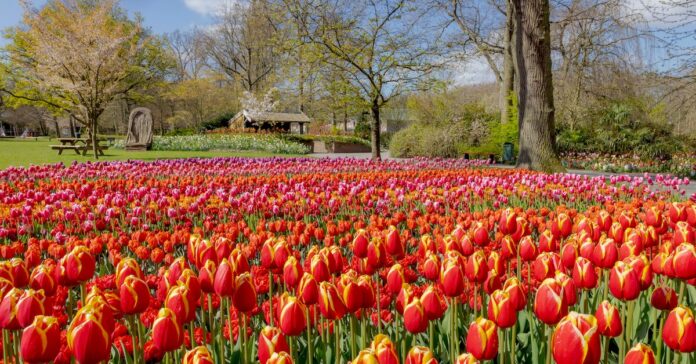There is no surer sign of spring approaching than seeing the first snowdrop peeking through the snow, or a crocus popping up through the grass. It brings cheer and hope, especially if you live in a place where winters are quite harsh. And even though just a single flower can make your heart soar, bring a smile to your face, and make you happy for the rest of the day, when the flowers come en masse, lots of them in one spot, it is even better.
In Europe, especially northern Europe, where seasons are quite pronounced, the arrival of spring flowers is an event to be enjoyed and searched out. And be they planted or wild, popping up in organized rows or on a meadow in the mountains, there are some great places to visit and marvel at what spring is creating.
I have listed here a wide variety of places where to enjoy the spectacle of emerging spring flowers, all stunningly beautiful and well worth changing your travel dates for.
Keukenhof tulips (Photo Credit: Laurens Lindhout / Keukenhof)
1. Tulips: Keukenhof, Netherlands
This is undoubtedly the most famous spring flower destination in the world. Opening between March 24 and May 15 in 2022, but always open around this time of year, Keukenhof Gardens celebrates the humble tulip, the national flower of the Netherlands, in all its various shapes and colors. Planted in rows, in swirls, around trees, and along paths, some 7 million bulbs produce a spectacle unlike any other. And there are not only tulips to see in Keukenhof, but other gorgeous flowers such as orchids, roses, daffodils, hyacinths, irises, lilies, and many more. Most reside in the outside gardens, but others can be found in the large pavilions, making this a perfect place to visit during the unpredictable weather of spring. A mere 25 miles from Amsterdam, Keukenhof is an ideal day trip from the capital.
Pro Tip: When booking your ticket, also book the Combiticket for bus and train, which will make using public transport from central Amsterdam very easy. Or you can rent a bike and ride to Keukenhof along dedicated cycle paths. There are even recharging points at the entrance for your e-bike.

2. Cherry Blossoms: Paris, France
Spending springtime in Paris is magical at the best of times, with the 400-plus parks all bursting into flower, but combine it with cherry blossom viewing, and you are in for a real treat. Within the city limits, the best places to go to enjoy the pink blossoms are the Square Marie Trintignant, between the Marais and the Seine; the tiny Square Gabriel Pierne by the Institut Francais; the amazing Jardin de Reuilly Paul Pernin along the Coulee Verte; and the Jardin des Plantes, with its large, ancient cherry tree. But for a complete blow-your-mind experience, take the RER B for a 20-to-30-minute ride from Gare du Nord to the Sceaux or Parc de Sceaux stations, and head to the Chateau de Sceaux. In its gardens, designed by Andre le Notre of Tuileries and Versailles fame, lies an old cherry orchard that is filled with some 150 trees, all laden down with pink fluffy blossoms. It is a sight you won’t ever forget. Just bring a picnic and settle under a tree, and you have the makings of a perfect day out.
Pro Tip: Take your time and also explore the cute chateau, the park and Sceaux itself, which is a pretty little village.

3. Poppies: Tuscany, Italy
Do you need another excuse to embark on that dream road trip through Tuscany? Okay, here it is: At the end of April, beginning of May, the fields across Tuscany are not green but red. Poppies pop up everywhere, and the effect is amazing. Interspersed with other wildflowers, nearly everywhere is filled with endless expanses of poppies, and you can drive for hours, stopping off regularly for pictures, seeing these delicate pretty flowers next to the roads. There is no place where there are more or fewer poppies, but if I had to name one region, maybe the Val d’Orcia, south of Siena is a good place to just drive and enjoy.
Pro Tip: Give it another 2 months, and you can enjoy pretty much the same fields not covered in red poppies but yellow sunflowers. It is really up to your personal preference which ones you choose to go and see.

4. Bluebells: Ashridge Estate, England
There is something very special about bluebells, those tiny little bells, more of a slightly purple hue than blue, but stunning, nevertheless. You can often see them wild on meadows or even in some gardens, but there is nothing more spectacular than walking through a dense forest, with only a few shards of light reaching down through the canopy and discovering the entire forest floor covered in bluebells. There are a few spots like this across Europe. I have walked among bluebells in North Yorkshire and near Fontainebleau in France, but another stunner is on the Ashridge Estate between Watford and Luton, roughly an hour’s drive north of London. Dedicated paths allow you to walk along this carpet of flowers without damaging them.
Pro Tip: You can get to Tring Station by train from London Euston, it’s roughly a 50-minute ride. From Tring, it’s a less than a 2-mile walk to the estate.

5. Crocuses: Tatra Mountains, Poland
Deep in the heart of the Tatra Mountains, along the border of Slovakia and Poland, lie meadows that turn from green to purple each spring. From the end of March, the meadows, set against the snow-covered rugged mountainous landscape, are covered in millions of tiny crocuses all of the same purple color. With a short lifespan of 2–3 weeks, this spectacle is a brief one, but so worth going out of your way for. Most of these meadows are far away from civilization, in a stunning landscape devoid of people, but one of the more accessible places in Chochołowska Valley, around 60 miles south of Krakow. These little flowers are under protection, and it is forbidden to break or pick them, so tread carefully.
Pro Tip: If you are visiting Poland but have no chance of venturing into the mountainous south, try the city Szczecin (pronounced “zuh-chin”) in the north near the Baltic Sea instead. Not quite a wild phenomenon, the city, however, has planted its own version of the so-called purple carpet in its parks.

6. Almond Blossoms: Andalucía, Spain
Because of its southern location, the almond blossom is (nearly) a winter flower experience, as the flowering season starts as early as January, but lasts into March, so I am including it here. In sunny Andalucía, in the Axarquia region of Malaga, they grow almonds across some 150,000 hectares (around 370,658 acres) of hilly land, and when the trees burst into flower, bit by bit and in different hues ranging from white to dark pink, it is a sight to see. This is a perfect road trip region, and following the Ruta de Almendra, or the “Almond Route,” will ensure you get the best viewpoints of the valleys filled with tree blossom.
If you want more than to simply drink in the views, why not stop at Almendrera del Sur in the hillside community of Cartama, where you can learn more about the almond products, sample them, and buy almonds in all sorts of forms as perfect souvenirs?
Pro Tip: While you are on your road trip through Andalucía, head to Cordoba, less than 100 miles inland from Malaga, where every second week of May a festival of flowers takes place. On the UNESCO list of Intangible Heritage, the Courtyards Festival of Cordoba allows you a peek into the city’s best courtyards, private and public, to check out the owners’ green fingers. The courtyards filled with flowers, potted plants, and scents are nearly overwhelming.
7. Daffodils: Farndale, England
Up in the North York Moors, 33 miles north of York, lies what is known as Daffodil Dale, a valley full of cheery yellow daffodils. There is a dedicated walk, some 3.5 miles long, with shorter and longer versions, which takes flower-lovers through the countryside dotted with the pretty spring flowers. What makes this even more special is that these are not the cultivated tall varieties you find in flower shops, but wild growing daffodils, which are a little shorter than the best-known types. Combining the beautiful Yorkshire countryside with a walk and countless wild, natural flowers makes for a beautiful day out. The walks are easy, not steep, but at times a little muddy, so come prepared with ‘sensible’ shoes.
Pro Tip: If you roll your eyes at a 3.5-mile walk, and prefer a decent hike, why not try the Coast to Coast Path, which also takes in Farndale? From Robin Hood’s Bay in the east across the entire country to St. Bees Head on the west, the 195 miles can be done in bite-sized segments.
Spring is coming, so be sure to check out these articles to wring in the new season:










